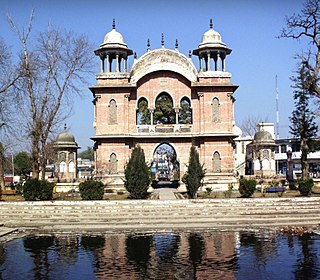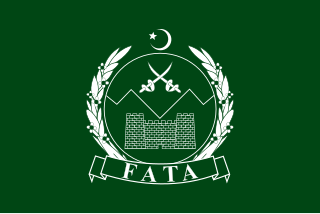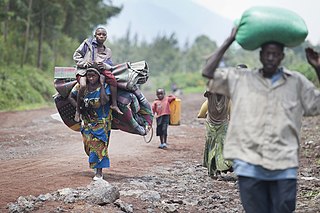Background

UNICEF was responsible to provide WASH facilities at camp level. In this regard they have selected IDP's to fulfill their works in camps e.g., SSD, IRSP, HRDS, HDOD, RID and many other.
The 2009 refugee crisis in Pakistan was the massive displacement of civilians in the Khyber Pakhtunkhwa of Pakistan that was caused by Operation Black Thunderstorm.
Since the beginning of Operation Black Thunderstorm against the Taliban, over 1.2 million people have been displaced in across Pakistan's Khyber Pakhtunkhwa, joined by a further 555,000 Pakistanis uprooted by fighting since August 2008. The refugees are known in Pakistan as Internally Displaced Persons (IDPs).
Most of the 1.2 million people who have escaped the violence were staying with relatives or friends, placing tremendous strain on the country, while over 300,000 others are seeking refuge in UNHCR-supported camps. [1]
By 22, 1 August.6 million of 2.2 million returned home, as per UN estimates. [2]

UNICEF was responsible to provide WASH facilities at camp level. In this regard they have selected IDP's to fulfill their works in camps e.g., SSD, IRSP, HRDS, HDOD, RID and many other.
For more information Special Support Group (IDPs)
| Country | Response |
|---|---|
| People's Republic of China's Ambassador to Pakistan Luo Zhao Hui had called on Prime Minister Yousuf Raza Gilani in Islamabad on Saturday and presented him a cheque of $1 million for refugees. Pakistan's Ambassador to China Masood Khan said that China's total contribution for assistance to the IDPs had now reached $5.4 million. [3] |
| Organization | Response |
|---|---|
| The United Nations made an international appeal for Pakistan IDPs and has so far received one-third of the $150 million it has sought. The UN agencies have provided for 780,000 IDPs as they expand their relief operations. [1] |
The fighting since August has so far left up to 2 million displaced.
The federal government was considering shifting the internally displaced persons (IDPs) from the refugee camps set up in Mardan, Nowshera, Swabi and other hot areas of NWFP to Abbottabad and Mansehra districts, as they are reportedly not acclimatised to hot weather. but due to negligence of federal government, it wasn't made a reality.
Managing Director Zumurrad Khan of the Pakistan Baitul Maal said that scorching heat in Mardan and other areas of Khyber Pakhtunkhwa was unbearable for the IDPs of Swat and Malakand Division. [4]

Khyber Pakhtunkhwa, commonly abbreviated as KP or KPK, is a province of Pakistan. Located in the northwestern region of the country, Khyber Pakhtunkhwa is the fourth largest province of Pakistan by land area and the third-largest province by population. It is bordered by the Pakistani provinces of Balochistan to the south, Punjab to the south-east, the territory of Gilgit-Baltistan to the north and north-east, Islamabad Capital Territory to the east and Azad Kashmir to the north-east. It shares an international border with Afghanistan to the west. Khyber Pakhtunkhwa has a varied landscape ranging from rugged mountain ranges, valleys, plains surrounded by hills, undulating submontane areas and dense agricultural farms.
The United Nations High Commissioner for Refugees (UNHCR) is a United Nations agency mandated to aid and protect refugees, forcibly displaced communities, and stateless people, and to assist in their voluntary repatriation, local integration or resettlement to a third country. It is headquartered in Geneva, Switzerland, with over 18,879 staff working in 138 countries.

An internally displaced person (IDP) is someone who is forced to leave their home but who remains within their country's borders. They are often referred to as refugees, although they do not fall within the legal definitions of a refugee.

Mardan District is a district in the Mardan Division of the Khyber Pakhtunkhwa province of Pakistan. The district is named after Mardan city, which is also the headquarters of the district. The district is famous for its agriculture industry and its archaeological sites, specifically of Takht-i-Bhai, Jamal Garhi and Sawal Dher.

Mardān is a city in the Mardan District of Khyber Pakhtunkhwa Province, Pakistan. Located in the Valley of Peshawar, Mardan is the second-largest city of Khyber Pakhtunkhwa. It is a fast-growing city that experienced a population boom in the latter half of the twentieth century.
Jalozai, also Jallozai, Jailozai, and Jelazee, is a village located in Nowshera District of Khyber Pakhtunkhwa Pakistan. Jalozai is famous for an Afghan refugee camp which is located about 35 kilometres southeast of Peshawar near the Afghanistan–Pakistan border.

Lieutenant-General Nadeem Ahmad is a retired senior three-star ranking general officer who is famed and widely honored for planning and coordinating the relief and reconstruction non-combatant military operations after the devastating earthquake of October 2005. Securing the appointment as the director of Federal Relief Commission of Pakistan Army, his credentials secured him the directorship of the Earthquake Reconstruction and Rehabilitation Authority (ERRA). After serving in the military for nearly 40 years, he was duly appointed as the chairman of the National Disaster Management Authority (NDMA); his efforts included the successful disaster management and preparations to contain the nationwide 2010 floods and coordinate the rescue operations in the Hunza Valley, Attabad Lake, and the Airblue crash.
Afghans in Pakistan are temporary residents from Afghanistan who are registered in Pakistan as refugees and asylum seekers. They fall under the jurisdiction of the United Nations High Commissioner for Refugees (UNHCR). Most of them were born and raised in Pakistan during the last four decades. Additionally, there are also Special Immigrant Visa applicants awaiting to immmigrate to the United States. Many Afghans in Pakistan receive financial support from family members in the Afghan diaspora.

The Federally Administered Tribal Areas was a semi-autonomous tribal region in north-western Pakistan that existed from 1947 until being merged with neighbouring province Khyber Pakhtunkhwa in 2018 with the Twenty-fifth Amendment to the Constitution of Pakistan passed by the Parliament as well as Provincial Assembly of KPK. It consisted of seven tribal agencies (districts) and six Frontier Regions, and were directly governed by Pakistan's federal government through a special set of laws called the Frontier Crimes Regulations.

The April 2010 Kohat bombings were a pair of bombings that struck a center for displaced people on the outskirts of the town of Kohat, in Khyber Pakhtunkhwa, Pakistan, on April 17, 2010. At least 41 people were killed, while another 64 more were injured. The next day another suicide bombing at a police station killed 7 more and injured nearly two dozen.

The Kampala Convention is a treaty of the African Union (AU) that addresses internal displacement caused by armed conflict, natural disasters and large-scale development projects in Africa.
Sudanese refugees are persons originating from the country of Sudan, but seeking refuge outside the borders of their native country. In recent history, Sudan has been the stage for prolonged conflicts and civil wars, as well as environmental changes, namely desertification. These forces have resulted not only in violence and famine but also the forced migration of large numbers of the Sudanese population, both inside and outside the country's borders. Given the expansive geographic territory of Sudan, and the regional and ethnic tensions and conflicts, much of the forced migration in Sudan has been internal. Yet, these populations are not immune to similar issues that typically accompany refugeedom, including economic hardship and providing themselves and their families with sustenance and basic needs. With the creation of a South Sudanese state, questions surrounding southern Sudanese IDPs may become questions of South Sudanese refugees.

Libyan refugees are people who fled or were expelled from their homes since the beginning of the Libyan Crisis in 2011, including during the First Libyan Civil War, that deposed Muammar Gaddafi in 2011, and the Second Libyan Civil War (2014–2020). Many people have been displaced from Libya to neighbouring Tunisia, Egypt and Chad, as well as to European countries across the Mediterranean. The majority of refugees from Libya are Arabs, though many others are sub-Saharan African migrants who were living in Libya. These groups were also among the first refugee waves to exit the country. The total number of Libyan refugees was estimated at around one million in June 2011, with most returning to Libya after the First Civil War ended. In January 2013, there were 5,252 refugees originating from Libya alongside 59,425 internally displaced persons registered by the UNHCR.

Pervez Khattak administration was the coalition of provincial government of Khyber Pakhtunkhwa between Pakistan Tehreek-e-Insaf (PTI), the Islamist Jamaat-e-Islami (JI), Qaumi Watan Party (QWP), and Awami Jamhuri Ittehad Pakistan (AJIP). AJIP later merged itself with PTI.
Special Support Group (SSG) is a unit of Inter-Services of Pakistan Armed Forces, having active since 2009, responsible for the relief and rehabilitation of Internally Displaced Persons (IDP) during War on Terror. The Special Support Group is an extended addition of special operations command of uniformed Inter-Services and the civilians, to provide support to executive difficult operations in civilian based areas, military logistics, security assistance, and administration.
The Sarhad Rural Support Programme (SRSP) is the largest non-governmental organization working to alleviate poverty in North West Pakistan. It was established in 1989 with the aim of reducing poverty and ensuring sustainable means of livelihood in what is now Khyber Pakhtunkhwa, Pakistan. SRSP is part of the Rural Support Programmes (RSP's) initiated by United Nations Environment Programme Global 500 Award winner Shoaib Sultan Khan. It is now the largest regional RSP, with extensive outreach into communities. In recent years because of its vast outreach, SRSP has had to play a prominent role in disasters that have hit Khyber Pakhtunkhwa. As a result, humanitarian work along with development has become a core competency of the organization.
A refugee crisis can refer to difficulties and dangerous situations in the reception of large groups of forcibly displaced persons. These could be either internally displaced, refugees, asylum seekers or any other huge groups of migrants.
Development programs in Tribal Areas are the various humanitarian, development and relief projects carried out by the Sarhad Rural Support Programme (SRSP) in the Federally Administered Tribal Areas (FATA) of Pakistan.
United Nations General Assembly Resolution 48/144 of 20 December 1993 is a resolution in which the General Assembly expressed its concern at the ongoing degradation of the humanitarian situation in Azerbaijan because of the displacement of considerable number of citizens due to Nagorno Karabakh conflict and supporting "emergency international assistance to refugees and displaced persons in Azerbaijan". The resolution is titled “48/114. Emergency international assistance to refugees and displaced persons in Azerbaijan”. It became the fifth United Nations document concerning Nagorno-Karabakh and the first United Nations General Assembly document on humanitarian aid to those affected by this conflict. This resolution was the first international document affirming the number of refugees and displaced persons in Azerbaijan exceeded one million. The document does not make any specific reference to previous UN resolutions on the ongoing conflict, but "its relevant resolutions regarding humanitarian assistance to refugees and displaced persons". The resolution was adopted by consensus without voting.